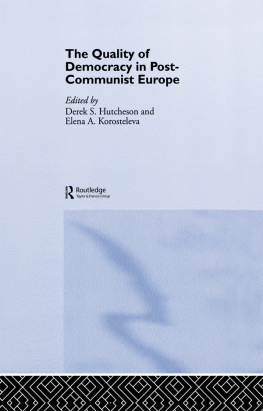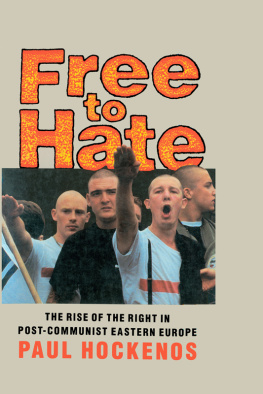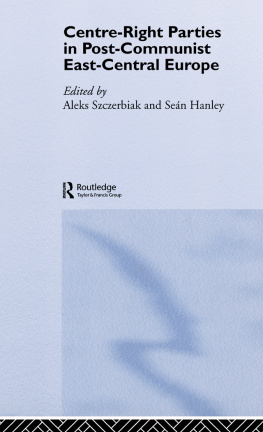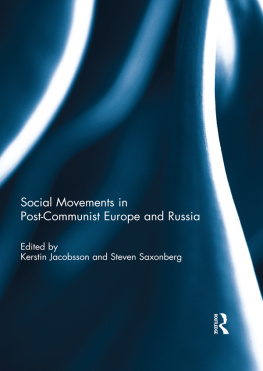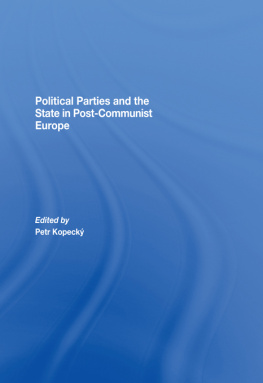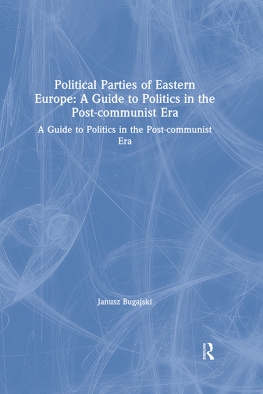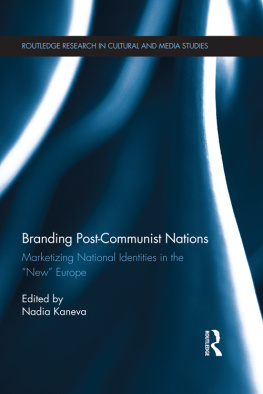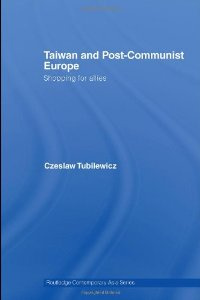The Quality of Democracy in Post-Communist Europe
The countries of the former Eastern Bloc and Soviet Union have exhibited remarkable diversity in their post-communist regime paths. Whereas some states have become demonstrably more democratic and have moved, in the space of fifteen years, from the periphery to the centre of European politics, in others the political and economic climates seem hardly to be better, and their societies no more free, than in the final years of the Cold War.
Assessing progress towards democracy in the former Eastern Bloc - or the lack of it - requires a qualitative examination of post-communist polities. This collection of articles brings together a number of perspectives, both macro-and micro-analytical, on the quality of democracy in post-communist Europe.
This volume was previously published as a special issue of The Journal of Communist Studies and Transition Politics.
Derek S. Hutcheson will be a Lecturer in Comparative Politics at University College Dublin, Ireland, from January 2006. He was previously a British Academy Postdoctoral Fellow in the Department of Politics, University of Glasgow.
Elena A. Korosteleva, formerly a British Academy Postdoctoral Fellow at the University of Glasgow, is now a Lecturer at the Department of International Politics at the University of Wales, Aberystwyth.
First published 2006 by Routledge
2 Park Square, Milton Park, Abingdon, Oxon OX14 4RN
Simultaneously published in the USA and Canada
by Routledge
270 Madison Avenue, New York, NY 10016
Routledge is an imprint of the Taylor & Francis Group
2006 Taylor & Francis Group Ltd
Typeset in Times by Techset Composition Limited
Printed and bound in Great Britain by Antony Rowe Ltd, Chippenham, Wiltshire
All rights reserved. No part of this book may be reprinted or reproduced or utilised in any form or by any electronic, mechanical, or other means, now known or hereafter invented, including photocopying and recording, or in any information storage or retrieval system, without permission in writing from the publishers.
British Library Cataloguing in Publication Data
A catalogue record for this book is available from the British Library
Library of Congress Cataloging in Publication Data
A catalog record for this book has been requested
ISBN 0-415-34807-2
Contents
Derek S. Hutcheson
Elena A. Korosteleva
Leonardo Morlino
Dirk Berg-Schlosser
Clare McManus-Czubiska
William L. Miller
Radosaw Markowski
Jacek Wasilewski
Stephen White
lan McAllister
Derek S. Hutcheson
Elena A. Korosteleva
Lucan A. Way
Paul G. Lewis
- 2. The Quality of Democracies in Europe as Measured
by Current Indicators of Democratization and Good Governance
Guide
Leonardo Morlino is Professor of Political Science at the University of Florence, Italy. He is the author of more than a hundred articles and books focusing on authoritarianism and democratic theory. His recent publications include Democracy Between Consolidation and Crisis: Parties, Groups, and Citizens in Southern Europe , 2nd edn. (2003) and Democrazie e Democratizzazioni (2003).
Dirk Berg-Schlosser is Professor of Political Science at Philipps University, Marburg, Germany. His recent publications include Authoritarianism and Democracy in Europe 191939 (2002, co-authored with Jeremy Mitchell), Poverty and Democracy (2002, co-authored with Norbert Kersting) and Democratization in Comparative Perspective (2004).
Clare McManus-Czubiriska is Lecturer in the Department of Central and East European Studies, University of Glasgow; William L. Miller is Edward Caird Professor of Politics, University of Glasgow; Radosaw Markowski is Director and Principal Investigator of the Polish National Election Survey Programme, Polish Academy of Sciences; Jacek Wasi- lewski is Head of the Unit of Elite and Political Behaviour Research, Polish Academy of Sciences.
Stephen White is Professor of International Politics at the University of Glasgow; and Ian McAllister is Director of the Research School of Social Sciences at the Australian National University, Canberra. They acknowledge the assistance of the UK Economic and Social Research Council under grant L213252007 to Stephen White, Margot Light and John Lwenhardt.
Derek S. Hutcheson will be a Lecturer in Comparative Politics at University College Dublin, Ireland, from January 2006. He was previously a British Academy Postdoctoral Fellow in the Department of Politics, University of Glasgow. His research focuses on the quality of democracy in postcommunist Europe, particularly in Russia and Eastern Germany, and he is the author of Political Parties in the Russian Regions (London/New York: RoutledgeCurzon, 2003). He wishes to acknowledge the financial support of the British Academy and UACES.
Elena A. Korosteleva, formerly a British Academy Postdoctoral Fellow at the University of Glasgow, is now Lecturer at the Department of International Politics at the University of Wales, Aberystwyth. Her recent publications include a special issue of the Journal of Communist Studies and Transition Politics on The Quality of Democracy in Post-Communist Europe (Vol. 20, No. 1, 2004, edited with Derek Hutcheson) and Postcommunist Belarus (Rowman & Littlefield, 2004, edited with Stephen White and John Lwenhardt).
Lucan A. Way is Assistant Professor of Political Science at Temple University, USA. He is writing a book with Steven Levitsky (Harvard University) on hybrid regimes in Africa, the Americas, Asia and post-Communist Eurasia. He is also working on a book focusing on the obstacles to authoritarian consolidation in the former Soviet Union.
Paul G. Lewis is Reader in Central and East European Politics at the Open University, where he has taught many courses in comparative politics, European studies and international relations. Major recent research topics have been the development of parties in post-communist Europe and the process of EU enlargement. Recent publications include Political Parties in Post-Communist Eastern Europe (2000) and Pan-European Perspectives on Party Politics (2003, with Paul Webb).
DEREK S. HUTCHESON and ELENA A. KOROSTELEVA
From the Second World War until the late 1980s, Europe was divided by a military Iron Curtain - an Eastern Bloc of communist-ruled, Soviet-oriented countries offset by a Western half allied to the North Atlantic Treaty Organization (NATO). Nowhere was this more clearly embodied than in Germany, where the presence of the Berlin Wall provided a stark reminder of the partition of the continent into Soviet and Western spheres of influence.
Just as its construction in 1961 had symbolized a further entrenchment in the division of Europe, images of the fall of the Wall in November 1989 epitomized the wider collapse of one-party rule in Eastern Europe. One by one, revolutions swept across the Eastern Bloc, as the communist parties, having ruled for some 40 years, lost their hold on power in the space of a few short months. The disintegration of the Soviet Union itself two years later led at least one philosopher to hypothesize the end of history. The Cold War was over; liberal democracy, it appeared, had won.
Fifteen years on from the collapse of the Wall, Europe is a very different place. Berlin is today the vibrant capital of reunited Germany, with little trace of the Wall remaining. The Czech Republic, Hungary and Poland, all former signatories to the Warsaw Pact, were admitted to NATO in 1999. May 2004 saw the enlargement of the European Union to embrace ten new member states, eight of which - the Czech Republic, Estonia, Hungary, Latvia, Lithuania, Poland, the Slovak Republic and Slovenia - were communist-ruled less than two decades ago. In most of the above-mentioned countries there have now been several rounds of free elections, and power has alternated between different ideological groupings.

